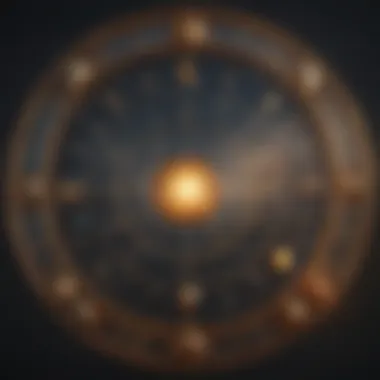Daily Horoscope Insights: Navigate Life with Astrology


Intro
Daily horoscopes have captivated individuals for centuries. Their significance extends beyond mere entertainment; they offer glimpses into personal growth and decision-making. Understanding these insights can help navigate daily challenges and opportunities.
Astrology is not a singular concept but a rich tapestry woven from various historical, cultural, and intellectual threads. It encompasses a variety of practices and beliefs that highlight the connection between celestial movements and human affairs. This guide will unpack the fundamental astrological concepts, delve into the exploration of zodiac signs, and examine celestial events that influence astrological predictions.
Astrological Concepts
Definition of Key Terms
Understanding key astrological terms is fundamental. Many people encounter terms like natal chart, transits, and aspects without fully grasping their meanings. A natal chart, for example, is a map of where the planets were in their journey around the sun at the exact moment of a person’s birth. Transits refer to the ongoing movement of planets and how they interact with one’s natal chart. Aspects are the angles formed between planets, influencing their interactions.
Historical Background of Astrology
Astrology's roots trace back to ancient civilizations such as the Babylonians, who created some of the earliest horoscopes around the 2nd millennium BCE. Various cultures, including the Greeks and Egyptians, contributed to astrological practices. Over time, astrology evolved, intertwining with philosophy and science, leading to the diverse forms we see today.
Overview of Different Astrology Branches
Astrology is not monolithic. Various branches exist, each with its focus:
- Natal Astrology: Focuses on individual natal charts, providing insights into personality and life path.
- Mundane Astrology: Analyzes world events and influences using astrological principles.
- Electional Astrology: Assists in selecting optimal times for events based on astrological conditions.
Understanding these branches enhances the application of horoscopes in daily life.
Zodiac Signs Exploration
In-Depth Analysis of Each Sign
The zodiac consists of twelve signs, each representing specific traits and tendencies. These signs are not just simple categories; they are complex archetypes that reflect various human experiences. For example, Aries embodies qualities like courage, while Pisces is associated with intuition. Exploring each sign reveals a deeper understanding of oneself and others.
Personality Traits and Characteristics
Each zodiac sign possesses unique characteristics. Here’s a brief overview:
- Aries: Energetic and assertive.
- Taurus: Reliable and practical.
- Gemini: Adaptable and communicative.
- Cancer: Nurturing and sensitive.
- Leo: Charismatic and bold.
- Virgo: Detail-oriented and analytical.
- Libra: Harmony-seeking and diplomatic.
- Scorpio: Intense and passionate.
- Sagittarius: Adventurous and philosophical.
- Capricorn: Disciplined and responsible.
- Aquarius: Innovative and independent.
- Pisces: Compassionate and imaginative.
Historical and Mythological Connections
Zodiac signs are steeped in historical and mythological contexts. Each sign has stories and symbols connected to various deities and myths, enriching their meanings. For instance, Libra is often associated with the balance of justice, relating to the goddess Astraea. Understanding these connections adds layers to the interpretation of horoscopes.
Celestial Events
Major Cosmic Phenomena
Celestial events like eclipses, retrogrades, and planetary alignments have significant implications in astrology. Eclipses often signify transformation and endings, while Mercury retrograde is commonly associated with communication challenges.
Impact of Celestial Events on Astrology
These events can alter daily horoscopes, affecting decisions and opportunities. Astrologers often emphasize the importance of these phenomena when providing insights on upcoming days.
Rituals and Practices During Celestial Events
Engaging in rituals can enhance the understanding of these cosmic events. Some people perform meditations, release old patterns, or set intentions during these times to align with the energies at play. These practices offer a way to harness the insights provided by the stars.
The exploration of astrology reveals its depth and complexity, offering more than superficial predictions. It serves as a profound tool for self-discovery and decision-making.
Understanding daily horoscopes, rooted in these concepts and practices, can guide individuals in navigating their daily lives. With awareness of astrological influences, one can approach challenges with greater insight and intention.
Understanding Daily Horoscopes
Understanding daily horoscopes is pivotal in grasping the intricate relationship between celestial movements and their influence on human behavior. This section will untangle the essence of horoscopes, their function in personal growth, and the considerations they embody.
Daily horoscopes serve not only as predictive tools but also offer insights that individuals can use to navigate daily challenges. They can provide clarity in decision-making by revealing patterns prompted by planetary positions. By recognizing these shifts, individuals can align their actions with the natural order, enhancing their chances for success.
Defining Daily Horoscopes
Daily horoscopes are astrological interpretations that present insights based on the position of celestial bodies at a given moment. These horoscopes are typically derived from one’s zodiac sign, which is determined by the location of the sun at the time of birth. The interpretation of these positions generates advice or predictions tailored to daily situations.
- The horoscope encompasses various elements, including:
- Zodiac signs, each corresponding to specific personality traits.
- Planetary positions, affecting energies and influences.
- Aspects, which reveal relationships between planets that can indicate harmony or conflict.


Overall, they summarize the cosmic vibrations of a particular day or period, allowing the reader to resonate with astrological movements.
The Role of Astrology in Daily Life
Astrology plays a vital role in daily life for those who choose to engage with it. Beyond mere entertainment, astrology can serve as a reflective tool that aids in understanding oneself and the surrounding world more comprehensively.
A few critical roles astrology can play are:
- Self-awareness: Understanding celestial influences can lead to deeper personal insights.
- Guided decision-making: With knowledge of the day's planetary influences, individuals can make more informed choices.
- Emotional balance: Astrology can provide a framework to address and better manage emotions.
Its relevance to individual experiences and collective interactions cannot be overstated. Astrology not only honors ancestral wisdom but also nurtures a path of self-awareness and proactive living.
Astrology teaches us that we are all connected, for we are all part of the universe.
Components of a Daily Horoscope
Understanding the components of a daily horoscope is essential for grasping its significance and implications in broader astrological practice. Each element contributes a unique aspect to the overall reading, providing layers of insights that support daily decision-making and self-reflection. By analyzing components such as zodiac signs, astrological aspects, and planetary influence, one can better appreciate how these elements work together.
Zodiac Signs Explained
Zodiac signs serve as the foundation of astrology. Each sign corresponds to specific personality traits and potentials influenced by celestial alignments. There are twelve zodiac signs: Aries, Taurus, Gemini, Cancer, Leo, Virgo, Libra, Scorpio, Sagittarius, Capricorn, Aquarius, and Pisces. Each sign covers a range of dates throughout the year and has its own element - fire, earth, air, or water.
Importance of Zodiac Signs:
- Character Traits: Each zodiac is associated with particular features, providing insight into individual behaviors and motivations.
- Elemental Influence: The elements help explain compatibility with other signs and their approach to experiences.
- Daily Guidance: Daily readings can offer sign-specific advice tailored to the current astrological climate.
Understanding one’s own zodiac sign, as well as the signs of those around, contributes to personal insights and interpersonal relationships.
Astrological Aspects
Astrological aspects refer to the angles between planets and other celestial bodies in the sky. These angles influence how the energies of those entities interact. Key aspects include conjunctions, oppositions, squares, trines, and sextiles.
Key Points about Astrological Aspects:
- Interpretive Framework: Aspects create a framework for interpreting how planetary energies interact.
- Dynamic Relationships: They show whether energies blend harmoniously or create tension, impacting daily experiences.
- Predictive Value: Aspects can aid in forecasting trends, cycles, and significant events in a person’s life.
Astrological aspects can reveal the underlying energies at play on a given day, guiding decisions and helping individuals understand timing.
Planetary Influence
The influence of planets in daily horoscopes is profound. Each planet symbolizes different energies, governings, and aspects of life. For instance, Mercury influences communication, while Venus governs love and relationships.
Why Planetary Influence Matters:
- Behavioral Patterns: Planets affect personal attributes and behavior, shaping reactions and experiences.
- Timing Factors: Knowledge of planetary positions assists with understanding the timing of personal decisions.
- Transitory Energy: As planets transit through signs, they alter the energy available for growth and transformation.
In daily horoscopes, the positioning of planets can provide insight into the flow of energy, allowing for informed choices that align with cosmic rhythms.
Astrological Methodologies
Astrological methodologies are essential in understanding how horoscopes are constructed and interpreted. The methodologies provide the framework through which astrologers analyze cosmic influences and their manifestations in daily life. This section delves into significance of astrological methodologies, covering techniques for chart calculation and the meaning of planetary transits.
Chart Calculation Techniques
Chart calculation refers to the systematic processes used to generate an astrological chart. It relies on astronomical data, including the date, time, and place of an individual's birth. These factors combine to illustrate the positions of celestial bodies at the precise moment of birth, contributing to a unique astrological profile. There are several methods to calculate these charts:
- Tropical Zodiac: Often used in Western astrology, it is based on the position of the Sun relative to the Earth.
- Sidereal Zodiac: This method, used in Eastern astrology, aligns with fixed constellations and incorporates astronomical observations.
Astrologers utilize complex mathematical equations to plot celestial positions accurately. Leveraging advanced software has made this process more accessible and efficient. The result is a detailed natal chart, which serves as the foundation for further astrological interpretations.
Transits and Their Meanings
Transits represent the movement of planets as they move through the zodiac and their ongoing influence on personal charts. Each planet's transit affects individuals differently, influencing emotions, decisions, and life events. Understanding these transits is crucial:
- Inner Planets: Mercury, Venus, and Mars have short-term effects. Their movements can significantly impact daily life, affecting communication, relationships, and action.
- Outer Planets: Saturn, Uranus, Neptune, and Pluto have long-term influences. Their transits can signify major life changes, shifts in career, or profound internal transformations.
Astrologers analyze current planetary transits in relation to the natal chart. This analysis offers valuable insights into forthcoming challenges and opportunities, allowing individuals to navigate their paths with awareness and intention.
Notably, the interpretation of transits requires a nuanced understanding of both the planets' characteristics and the individuals' unique circumstances.
Engaging deeply with astrological methodologies allows individuals to harness celestial insights for personal growth and decision-making. These methodologies provide a robust toolkit for anyone seeking to understand the implications of celestial movements in their lives.


Applying Astrology to Personal Insights
Astrology offers a lens through which individuals can gain deeper understanding of their life choices and interpersonal relationships. Applying astrology to personal insights can greatly enhance one's decision-making process and awareness of oneself in the context of social and personal endeavors. When individuals engage with astrological readings, they can pinpoint significant times for various activities, aligning these activities with favorable planetary positions. Often, this aligns with the desire for foresight and preparedness in navigating life's complexities.
Decision Making with Horoscopes
Making informed decisions is a crucial aspect of daily living. Horoscopes can serve as valuable tools for this purpose. When one reads their daily horoscope, it provides guidance based on current astrological influences which can affect emotions, career choices, and relationships. Understanding these influences can lead to more considered decisions.
For example, if a horoscope suggests that communication could be challenging on a particular day due to Mercury's retrograde, individuals may choose to postpone important discussions or projects. This can reduce misunderstandings and lead to more favorable outcomes.
Moreover, utilizing horoscopes to assess the best days for specific activities can help optimize personal productivity. Consider the following points for making decisions using horoscopes:
- Evaluate Daily Influences: Regularly check the daily aspects noted in your horoscope.
- Reflect on Past Experiences: Understand how similar astrological influences have affected you previously.
- Align with Personal Goals: Use horoscopes to ensure your activities align with your aspirations.
Although horoscopes shouldn’t dictate every decision, they can serve as supplementary tools for introspection.
Understanding Compatibility
Astrology also plays a significant role in assessing compatibility with others. Whether in friendships, family dynamics, or romantic relationships, understanding astrological compatibility can reveal inherent strengths and weaknesses. It allows individuals to see how their own zodiac signs interact with those of their friends or partners.
For instance, certain signs may exhibit natural affinity based on elemental compatibilities, such as fire and air, while others may encounter challenges due to differing approaches to communication or emotional expression.
Recognizing these compatibilities involves:
- Analyzing Zodiac Elements: Assess whether they belong to the same or complementary elements (fire, earth, air, water).
- Understanding Individual Needs: Each sign has distinct needs and communication styles.
- Navigating Conflicts: Awareness of compatibility can aid in resolving conflicts and fostering stronger connections.
By taking the time to contemplate astrological compatibility, individuals can enhance their interpersonal relationships, leading to a more harmonious life overall.
Understanding one's astrological influences doesn't replace personal responsibility. Instead, it serves as guidance toward more conscious choices and relationship approaches.
Cultural Variations in Astrology
Understanding the cultural variations in astrology is essential in grasping the full perspective of how daily horoscopes function across different societies. Each culture has its unique interpretation and methodology, leading to diverse practices and beliefs. This section delves into the key aspects of Western and Eastern astrology, as well as different cultural contexts. By doing so, we gain insights into the adaptability and richness of astrological practice worldwide.
Western vs.
Eastern Astrology
Western astrology is primarily influenced by the twelve zodiac signs and the planets that govern them. It emphasizes the position of celestial bodies at the time of an individual's birth. Western horoscope readings often focus on personality traits and life events, which are constant themes in individuals' lives.
Conversely, Eastern astrology, particularly Chinese astrology, differs significantly. It uses a lunar calendar, incorporating a twelve-year cycle with animal signs. Each year is associated with a particular animal, which shapes the personality and fortunes of those born in that cycle.
Some key distinctions include:
- Elemental Systems: Western astrology includes four elements: fire, earth, air, and water. Eastern astrology incorporates wood, fire, earth, metal, and water, impacting interpretations.
- Focus on Time: Western astrology often emphasizes psychological traits, while Eastern astrology focuses on harmony and cycles of life.
- Cultural Context: In Western societies, astrology might guide personal decisions, while in Eastern cultures, it often plays a role in family and social dynamics.
Astrology in Different Cultures
The interpretation of astrology varies across cultures, affecting how daily horoscopes are perceived and utilized. In Hinduism, for instance, jyotish or Vedic astrology holds substantial significance. It employs a sidereal zodiac and is deeply intertwined with spirituality and astrology's influence on dharma, or purpose.
In ancient Egypt, astrology intertwined with their beliefs about the afterlife and the gods. The sky's movements provided vital agricultural advice, relying heavily on cycles of nature.
Different cultural astrological practices can be summarized as follows:
- Indian Astrology (Jyotish): Strongly tied to spirituality and karma.
- Mayan Astrology: Focused on the Tzolk'in calendar and the spiritual aspects of life.
- Native American Astrology: Connects celestial movements with nature and animal spirits, guiding community and personal decisions.
Understanding these cultural frameworks enables a more profound appreciation of daily horoscopes. Each cultural approach contributes to the broader astrological tapestry, showcasing its versatility and relevance in guiding individuals through their lives.
The practice of astrology is not monolithic; it reflects the cultural inputs that shaped its features and beliefs.
Common Misconceptions about Horoscopes
Daily horoscopes can often face skepticism and misunderstanding. It is crucial to address these misconceptions, as they significantly shape how people perceive astrology. Understanding these misconceptions creates a clearer picture of what horoscopes provide and enhances their practical applications in daily life.
Astrology vs.
Astronomy
Astrology and astronomy are often mistakenly viewed as interchangeable fields. They share roots, historically, but diverge significantly in purpose and methodology. Astronomy is the scientific study of celestial bodies, focusing on their physics and behavior in the universe. It is grounded in empirical research and employs rigorous methods to explore the cosmos.
Conversely, astrology interprets celestial events and their positions in relation to human affairs. Astrologers analyze the alignment of planets and stars at a specific time to predict influences on individuals' lives. While astronomy seeks answers about the universe objectively, astrology incorporates psychological and spiritual dimensions.


Understanding this distinction is essential for those trying to comprehend horoscopes. Recognizing that horoscopes are not predictions based on scientific evidence, but rather interpretations rooted in symbolism and tradition, is vital.
Debunking Myths
Several myths surround horoscopes that can tarnish their credibility and benefits. Addressing these myths encourages a more rational and open-minded approach to astrology. Here are some common myths along with their explanations:
- Horoscopes are always accurate: While horoscopes can provide valuable insights, they are not infallible. Personal circumstances and choices also shape outcomes.
- Astrologers determine fate: Astrology does not decide fate; it offers guidance. The interpretations encourage self-reflection and assist in making informed decisions.
- All signs are the same: Each zodiac sign has unique attributes and influences. It is misleading to think they all experience the same events.
- Astrology is superstition: Many scholars recognize astrology as a symbolic language that provides deeper understanding. It is not mere belief but a traditions with historical significance.
By clarifying these misconceptions, individuals can approach astrology and daily horoscopes with a clearer mindset. Horoscopes serve as tools for personal growth, offering insights that empower individuals to navigate life's complexities with a firmer sense of direction.
Holistic Approaches to Astrology
Astrology is not merely a study of celestial bodies; it can also promote a more wholistic view of personal well-being. This section delves into how astrology intertwines with various aspects of a healthy lifestyle. The fusion of astrological principles with wellness practices enriches self-awareness and fosters personal growth.
Integrating Astrology into Wellness Practices
Astrology can complement wellness by providing insights that align with an individual's personal journey. Recognizing the impact of planetary positions can guide one’s health choices. For example, knowing which sign is in control of certain body parts can optimize focus on those areas.
Some people use their natal charts to inform their exercise routines, dietary choices, or meditation practices, enhancing their overall well-being. Here are effects of integrating astrology into daily routines:
- Mindfulness Practices: Aligning meditative practices with lunar phases can nurture deeper connects to the self.
- Nutrition: Certain zodiac signs are associated with specific food groups, suggesting a tailored diet based on astrological indicators.
- Physical Activity: Planning workout sessions around favorable transits can potentially increase motivation and results.
Personal zen can be achieved when wellness practices reflect astrological insights. By consciously connecting health routines to cosmic energies, individuals may find themselves better aligned with their inner needs.
Astrology and Personal Growth
Astrology also serves as a mirror for personal reflection and development. It helps individuals understand their strengths and weaknesses through the lens of their charts. The placement of planets reveals patterns in behavior and experiences, thus guiding personal evolution.
Benefits of using astrology for growth include:
- Self-Awareness: Recognizing one's traits aids in making informed personal decisions.
- Goal Setting: Understanding transits lets individuals time their ambitions appropriately.
- Conflict Resolution: Identifying personality clashes through astrological insights facilitates better communication and understanding in relationships.
“Astrology offers not just predictions, but a roadmap for personal transformation.”
Future Trends in Astrology
The landscape of astrology is evolving rapidly. As we move further into the digital age, the ways in which people engage with astrology are undergoing significant changes. Understanding these trends is essential, especially for those deeply invested in astrological practices. This section explores the influence of technology and personalization in astrology.
Astrology in the Digital Age
The advent of the internet has revolutionized many fields, including astrology. Nowadays, people can access a wealth of astrological information at their fingertips. Websites, apps, and social media platforms have enabled individuals to connect with astrology in unprecedented ways.
Key Elements of Digital Astrology
- Accessibility: Astrology is now more accessible than ever. This democratization allows individuals from various backgrounds to explore their natal charts and horoscopes without needing a professional astrologer.
- Community Engagement: Social media platforms, like Facebook and Reddit, have fostered communities where users can exchange insights, ask questions, and share their experiences.
- Learning Resources: Online platforms provide tutorials, webinars, and articles that cater to both novices and advanced practitioners. This vast pool of learning opportunities enhances the overall understanding of astrological concepts.
The rapid advancement of technology also creates new trends. For instance, machine learning algorithms analyze astrological data. This leads to more refined readings and predictions that can adapt to individual preferences and situations.
The Rise of Personalized Astrology Services
As astrology moves into the digital age, personalized services are gaining traction. People are now seeking tailored astrological insights that reflect their unique circumstances. This shift towards personalization enhances the relevance of astrological advice, making it more applicable to daily life.
Benefits of Personalized Astrology
- Customized Readings: Unlike generic horoscopes, personalized readings take into account specific birth data, including time and place, which allows for more accurate predictions.
- Focused Guidance: Clients can focus on particular life aspects, such as relationships, career, or health, making the guidance they receive much more applicable.
- Engagement with Professionals: With platforms like Korra and Astrolabe, individuals can consult professional astrologers in real-time, creating a more interactive experience.
The rise of personalized astrology services highlights a significant shift in how individuals wish to relate to their astrological insights.
Finale: The Relevance of Daily Horoscopes
Daily horoscopes hold a special significance for many. Their relevance stems from a blend of ancient wisdom and modern interpretations of astrological principles. These insights help individuals navigate their daily lives with more awareness. They provide a framework through which one can reflect on experiences and decisions.
Understanding what daily horoscopes can reveal about personal challenges is crucial. Each day presents new opportunities and risks, and the astrological readings serve as a guide. They can encourage proactive decision-making. Knowing what to expect can alleviate anxiety and prepare one for challenges ahead.
Reflecting on Daily Guidance
Daily horoscopes are more than just predictions. They serve as mirrors reflecting our emotions, choices, and circumstances. Engaging with horoscopic guidance fosters a sense of mindfulness. Readers often find clarity by connecting their experiences with the cosmic energies described in their readings. For example, recognizing a period characterized by Mercury retrograde can inform one’s approach to communication and decision-making.
This awareness also helps develop intuition. The more one reflects on the guidance provided, the more adept one becomes at recognizing patterns. Each horoscope becomes a tool for self-examination. Reflecting on daily insights can enhance personal growth and provide further understanding of life’s cycles.
Embracing Astrological Insights
Adopting the insights from horoscopes involves a shift in perception. Rather than viewing them as mere entertainment, one can appreciate their potential for deeper understanding. Embracing these insights means being open to the lessons they may offer. It encourages individuals to align themselves with universal energies, creating a harmonious relationship with their surroundings.
A practical start could be tracking daily readings in a journal. Noting how predictions play out encourages personal accountability. It allows one to assess the accuracy of astrological insights and their relevance to personal situations.
This process of integration can lead to new discoveries about oneself and one's journey.







